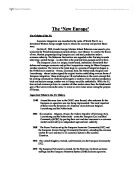Jessica Leskowski
Europe?
As the Buddha said, “What you are is what you have done, what you will be is what you do now”. Although this quote was meant to be applied to the understanding of oneself, for self-reflection and the growth of individuals, I find it very applicable to my understanding of a very large group of people: the continent of Europe. In my opinion, Europe today is the sum of it’s past; it is the collection of its unique historical events over the course of two millennia, which define the religious, geographical, and political characteristics of this great continent. In 1751, Europe, as described by Voltaire was “a kind of great republic divided into several states… all corresponding with one another… [and having] the same religious foundation… [and] the same principle of public law and politics, unknown in other parts of the world.” Today, the Europe that I have in mind is quite similar.
As a continent once named ‘Christendom’ ( denoting a common Christian identity ), and referred to as the ‘Christian Commonwealth’, the religious history of Europe is a significant area in which this continent can be defined. As according to Voltaire, although “divided into several confessions”, the states of Europe “all have the same religious foundation.” Even when the label of Christendom was dropped in the 1700’s Christianity continued to play a prominent role in the European civilization. T.S. Eliot stressed the centrality of the Christian tradition, saying: “The dominant feature in creating a common culture between peoples… is religion… I am talking about the common tradition of Christianity which has made Europe what it is.” He goes on to explain that, “it is in Christianity that our arts have developed; it is in Christianity that the laws of Europe—until recently—have been rooted. It is against a background of Christianity that all our thought has significance. An individual European may not believe that the Christian Faith is true; and yet what he says, and makes, and does, will all… depend on [the Christian heritage] for its meaning.” In this statement, Eliot summarizes perfectly the central Christian characteristic of Europe, as I understand it, that has affected every other aspect of the heritage of this European community.







